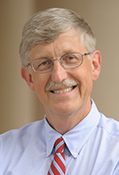 |
| NIH Director Francis Collins |
The National Institutes of Health has persuaded 10 rival drugmakers to briefly set aside their competitive spirits and collaborate on drug discovery projects in four major diseases, pooling their data and expertise to kick-start early-stage efforts.
Under the 5-year plan, the drugmakers will contribute some of their brightest minds in Alzheimer's, Type 2 diabetes, rheumatoid arthritis and lupus, working with NIH in a $230 million initiative to identify new treatments for the diseases. Participants are required to share their current relevant research, and no one is allowed to launch a commercial effort based on any of the group's findings until the data is made public.
The ambitious effort, called the Accelerating Medicines Partnership, unites Johnson & Johnson ($JNJ), AbbVie ($ABBV), Bristol-Myers Squibb ($BMY), Merck ($MRK), Pfizer ($PFE), Sanofi ($SNY), GlaxoSmithKline ($GSK), Takeda, Biogen Idec ($BIIB) and Eli Lilly ($LLY), plus nonprofits including the American Diabetes Association and the Alzheimer's Association.
If all goes according to plan, the group will first chart molecular pathways for each of the four ailments--creating "a Google Maps of human disease," as Pfizer R&D chief Mikael Dolsten phrased it to the Wall Street Journal--thereby clearing the way for ground-breaking development efforts on a scale thus far unseen, NIH figures.
The potential benefits are huge, NIH Director Francis Collins said. On average, it takes more than 14 years and $1 billion to get a drug from discovery to marketing, he said, and with a failure rate of roughly 99%, the industry has plenty of room to improve its process of identifying and validating targets before making high-dollar bets.
Consider, Collins said, the PCSK9 pathway for cardiovascular treatments. Researchers discovered that people with low levels of the enzyme had healthier levels of bad cholesterol but were otherwise perfectly fine, thus sparking the imaginations of drug developers and spurring a years-long development effort through which a bevy of PCSK9-blocking Phase III contenders are now queuing up to break into what could be a $10 billion market.
"We believe there are a lot of other PCSK9s out there to be discovered," Collins said at a news conference Tuesday. "We just need to assemble the right team to do so. You are looking at that team."
But, this being Big Pharma, it's not all science for science's sake. Collins' initial plan was to target 5 diseases, including schizophrenia, but that ailment fell off the list when the partner companies expressed little interest in its potential, a move that "was more business than science," Collins told the Journal. That omission led Roche ($RHHBY) to watch from the sidelines, according to the newspaper, and Amgen ($AMGN) skipped out because the project overlaps with its own disease-mapping mission, the goal behind its $415 million buyout of deCODE in 2012.
Still, despite some business-related hiccups in the organization phase, Collins and his team believe they've designed a system that maximizes the utility of every player involved. The project sort of splits the difference between Socratic collaboration and fevered revenue-chasing, forcing the companies to mind their manners during an open-source discovery stage and then sending them off to the competitive races once a project bears fruit, counting on their desire for first-mover profits to deliver new therapies to patients as quickly as possible.
From the industry's perspective, the project gives the partners an opportunity to take an all-encompassing approach to drug discovery that "could not be done by any single organization," Sanofi R&D chief Elias Zerhouni told the Journal. "Even the NIH, with all of its might, doesn't have all of the solutions inside it. And no one company can do it."
For GSK, which has made strides to open up its vaults of data for research over the past few years, AMP's founding principles of collaboration made joining up a "no-brainer," Senior Vice President of Alternative Discovery and Development Lon Cardon said. But beyond its philosophical promise, the group's greatest strength will be its ability to bring disparate experts to the same table, he said. Take Alzheimer's for example, GSK largely exited neurodegenerative ailments about four years ago, but the prospect of teaming up with innovators from across the industry has given the company some renewed hope of making a difference in that disease.
"We were really struggling in trying to succeed on our own," Cardon told FierceBiotech. "We think the way to do this is to make it a team sport for these really difficult ones. For us, this is a good way in for Alzheimer's."
- read the WSJ story (sub. req.)
- check out NIH's announcement